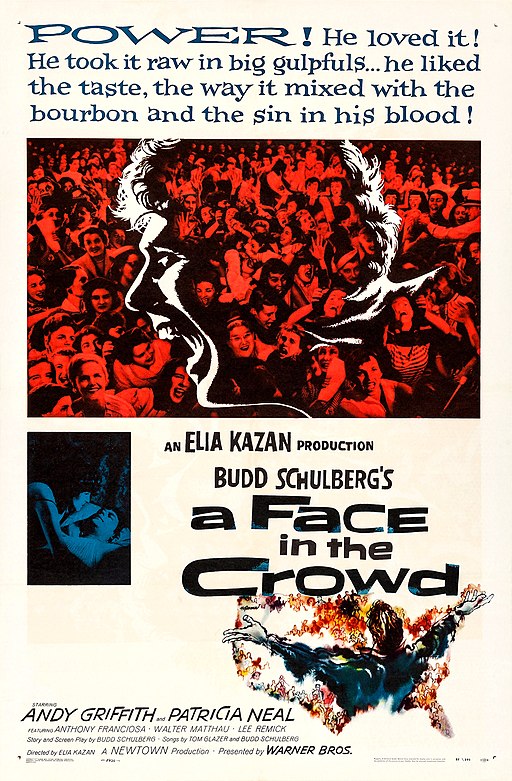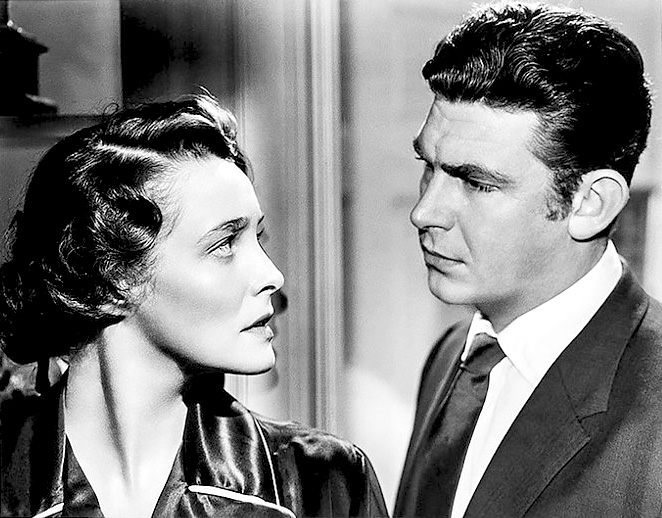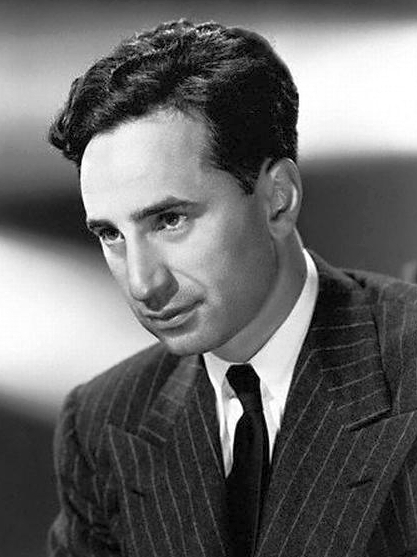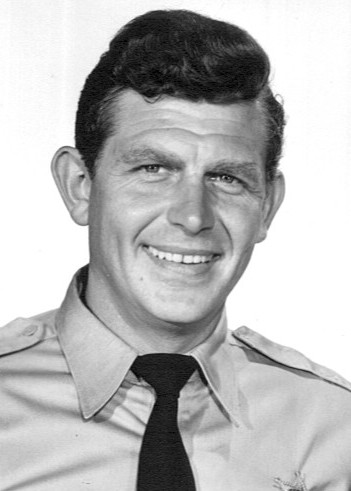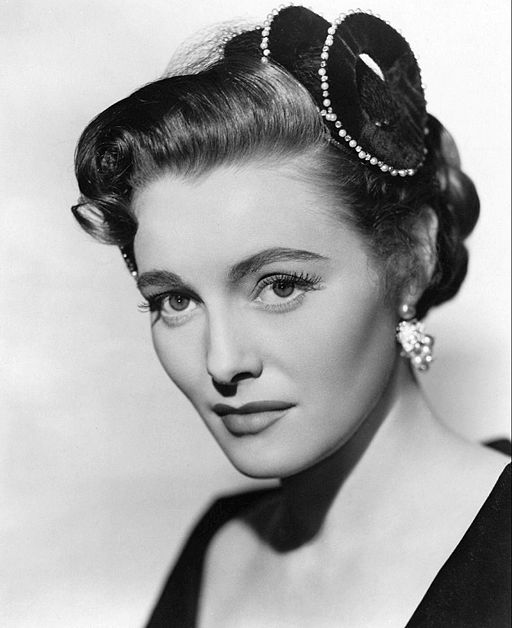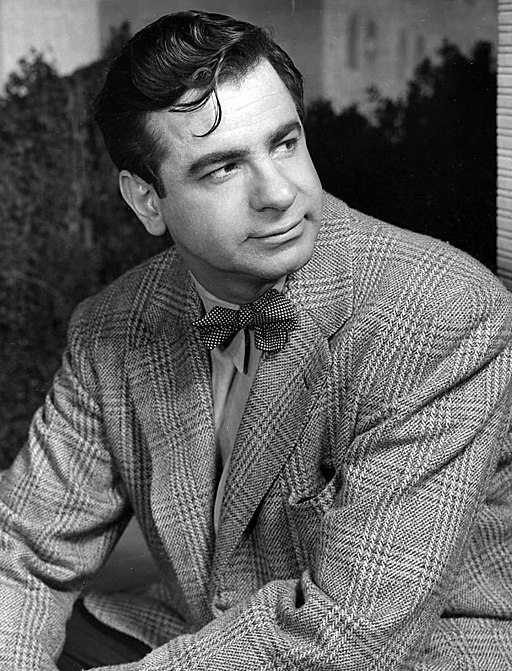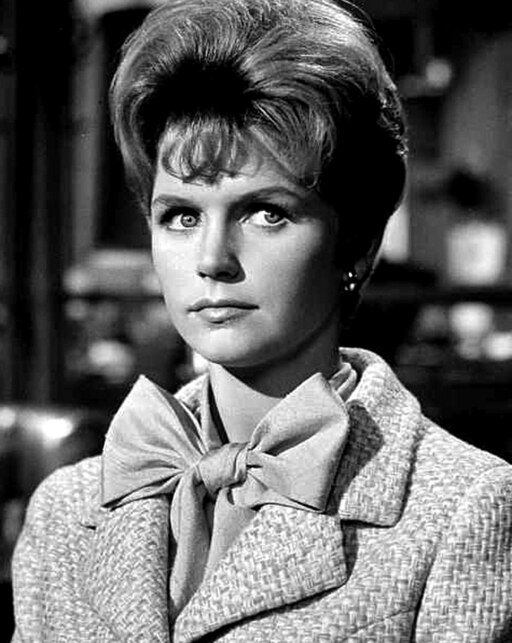A Face in the Crowd - 1957
back| Released by | Warner Bros. |
| Director | Elia Kazan |
| Producer | Elia Kazan |
| Script | Budd Schulberg |
| Cinematography | Harry Stradling |
| Music by | Tom Glazer |
| Running time | 126 minutes |
| Film budget | $1.6 million |
| Box office sales | Approximately $ 500.000,- |
| Main cast | Andy Griffith - Patricia Neal - Walter Matthau - Anthony Franciosa - Lee - Remick |
A Face in the Crowd
A Cautionary Tale of Charisma Corrupted by Power
"A Face in the Crowd" (1957), directed by Elia Kazan and written by Budd Schulberg, tells the story of Larry "Lonesome" Rhodes (Andy Griffith), a charismatic but manipulative drifter who rises from obscurity to national fame, ultimately wielding his media influence for personal gain and political manipulation.
The film critiques the power of television and the dangers of celebrity culture, showcasing Griffith's remarkable performance that reveals the dark side of charm and influence.
Related
A Face in the Crowd - 1957
"A Face in the Crowd" (1957) is a powerful and prescient film directed by Elia Kazan, from a screenplay by Budd Schulberg. It tells the story of Larry "Lonesome" Rhodes, a drifter with a folksy charm and a gift for persuasion, who rises from an obscure jail cell to national fame, ultimately wielding an enormous influence over the public and the political landscape of the United States. The film is a critique of the cult of personality, the manipulative potential of media, and the dangers of demagoguery, themes that remain relevant today.
Summary
The story begins in a rural Arkansas jail, where Marcia Jeffries, a local radio producer, discovers Rhodes while searching for a feature for her show. Charmed by his rough honesty and natural charisma, she offers him a spot on her program. Rhodes quickly captures the hearts of listeners with his down-to-earth humor and homespun wisdom, earning the nickname "Lonesome" Rhodes. As his popularity soars, he moves from radio to television, becoming a national celebrity and a powerful media figure.
Rhodes's ascent is rapid and his influence expansive, extending into commercial endorsements and political commentary. He becomes a kingmaker, instrumental in the rise of a senatorial candidate, showcasing his ability to sway the public opinion with ease. However, his rise to power reveals a darker side: Rhodes is manipulative, egotistical, and devoid of the very sincerity that his audience adores in him.
Marcia, who has fallen in love with Rhodes, becomes disillusioned by his transformation. She witnesses his moral decay and the cynical exploitation of his influence for personal gain and power. The climax of the film arrives when Marcia, recognizing the danger Rhodes poses, exposes his true contempt for his audience during a live television broadcast, leading to his downfall.
Analysis
"A Face in the Crowd" explores the themes of power, media, and the creation of celebrity. Kazan and Schulberg critique not just the individuals who manipulate these forces for personal gain, but also the societal structures that enable them. The film is prophetic in its examination of how television, and by extension, all media, can fabricate realities and shape public consciousness, a concept that resonates in the age of social media and reality television.
The character of Lonesome Rhodes is a complex figure, simultaneously charming and repulsive, embodying the dual nature of celebrity as both a source of inspiration and a vehicle for manipulation. Andy Griffith's performance is a tour de force, capturing the charisma and eventual corruption of Rhodes with depth and nuance. The supporting cast, particularly Patricia Neal as Marcia Jeffries, provides a moral counterpoint to Rhodes's amoral ambition, highlighting the personal costs of his rise.
The film's visual style, with cinematography by Harry Stradling, complements its thematic concerns, juxtaposing the warmth of Rhodes's public persona with the cold, manipulative reality of his behind-the-scenes machinations. The use of real-life media personalities in cameo roles blurs the line between fiction and reality, reinforcing the film's message about the power of media to influence and distort.
Conclusion
"A Face in the Crowd" remains a critical commentary on the dangers of unchecked ambition, the cult of personality, and the media's role in shaping public opinion. Its relevance has only grown over time, serving as a cautionary tale about the power of charisma and the vulnerability of democracy to the forces of manipulation and demagoguery. Kazan's direction and Schulberg's screenplay deliver a timeless critique of American culture, media, and politics, making "A Face in the Crowd" a landmark film in American cinema.
Classic Trailer "A Face in the Crowd":
Analysis of Elia Kazan’s Direction:
Elia Kazan's direction in "A Face in the Crowd" (1957) is a masterclass in storytelling, character development, and thematic exploration, showcasing his unique ability to weave complex social and political themes into compelling narrative cinema. Kazan, known for his work both in film and theater, brings a nuanced understanding of character psychology and social dynamics to the film, making it a powerful and prescient critique of media influence, celebrity culture, and the corruption of power.
Psychological Depth and Realism
Kazan's direction is characterized by its psychological depth and realism. He has a keen eye for the complexities of human nature, which is evident in the way he portrays the transformation of Larry "Lonesome" Rhodes from a charming drifter to a manipulative media mogul. Kazan guides Andy Griffith through a performance that captures this dramatic arc with authenticity and intensity. Under Kazan's direction, Griffith delivers a multifaceted portrayal that is both charismatic and chilling, inviting both empathy and revulsion from the audience. This complex character study is a hallmark of Kazan's directorial approach, emphasizing the moral ambiguities and contradictions within individuals.
Visual Storytelling
Kazan's visual storytelling in "A Face in the Crowd" complements its thematic concerns. He employs cinematography, framing, and mise-en-scène to underscore the film's critique of television and media as instruments of manipulation. Kazan uses close-ups and medium shots to create intimacy with Rhodes, drawing viewers into his charismatic spell, only to later expose the sinister machinations behind his folksy facade. The contrast between the warm, inviting glow of Rhodes's public appearances and the stark, shadowy scenes of his private moments enhances the film's exploration of authenticity versus artifice.
Engagement with Social Themes
Kazan's films are known for their engagement with social and political themes, and "A Face in the Crowd" is no exception. He adeptly uses the medium of cinema to critique the media's role in shaping public opinion and the dangers of demagoguery. Kazan's direction is both a reflection of and a commentary on the American psyche, exploring the allure of power and the vulnerability of democracy to charismatic leaders who exploit mass media for personal gain. Through "A Face in the Crowd," Kazan warns of the consequences when society fails to discern truth from manipulation, a theme that remains eerily relevant.
Collaborative Brilliance
Kazan's collaboration with screenwriter Budd Schulberg is another critical aspect of his directorial success. Their shared vision for the film's message and their ability to translate complex ideas into a compelling narrative underscore Kazan's skill in working closely with writers to craft cinematic works that are both intellectually and emotionally engaging.
Conclusion
Elia Kazan's direction in "A Face in the Crowd" exemplifies his strengths as a filmmaker: his ability to draw profound performances from his actors, his skillful use of visual elements to enhance narrative and thematic depth, and his unwavering commitment to exploring significant social issues. Kazan's work on the film not only showcases his directorial prowess but also solidifies the movie's status as a timeless critique of the media's power and the ethical responsibilities of those who wield it. Through "A Face in the Crowd," Kazan delivers a cinematic experience that is both a reflection on and a warning about the seductive dangers of charisma and power in the hands of the unscrupulous.
The unforgettable Performance of Andy Griffith:
Andy Griffith's performance in "A Face in the Crowd" (1957) marks a pivotal and unforgettable role in his career, showcasing his exceptional range as an actor far beyond the affable, folksy characters he is most widely known for, particularly Sheriff Andy Taylor in "The Andy Griffith Show." In "A Face in the Crowd," Griffith portrays Larry "Lonesome" Rhodes, a character whose journey from charming drifter to manipulative media powerhouse provides a rich canvas for Griffith to explore a complex array of emotions and motivations.
Transformation and Range
Griffith's portrayal of Lonesome Rhodes is a study in transformation, capturing the character's rise from obscurity to fame and his subsequent moral decay. The actor's performance is remarkable for its range, seamlessly transitioning from warmth and humor to darkness and megalomania. Griffith embodies Rhodes with a natural charisma that makes the character's initial appeal understandable, even irresistible, to the audience and the characters within the film. Yet, as Rhodes gains power, Griffith adeptly reveals the character's manipulative, egotistical, and ultimately hollow core.
Charisma and Vulnerability
One of Griffith's strengths in this role is his ability to balance Rhodes's charismatic public persona with glimpses of his vulnerability and insecurity. These moments of vulnerability are crucial, as they add depth to Rhodes, making him a more nuanced and tragic figure rather than a mere villain. Griffith's nuanced performance invites viewers to ponder the sources of Rhodes's ambition and need for adulation, suggesting a profound emptiness and desire for validation.
Physicality and Vocal Work
Griffith's physicality and vocal work in the film are integral to his character's evolution. His body language and vocal tone shift dramatically as Rhodes transitions from a genial entertainer to a powerful influencer, then to a despised figure facing his downfall. Griffith uses his imposing stature to dominate scenes, embodying Rhodes's growing sense of invincibility and later, his desperation. His voice, initially warm and inviting, becomes increasingly bombastic and authoritative, mirroring his character's escalating power and detachment from his roots.
The Climactic Revelation
The climax of the film, where Marcia Jeffries exposes Rhodes's disdain for his audience, is a testament to Griffith's skill. The shock, betrayal, and rage that Griffith displays as Rhodes realizes he's been exposed are palpable. This moment is crucial, as it encapsulates the character's fall from grace, and Griffith executes it with a raw intensity that is both shocking and deeply moving.
Conclusion
Andy Griffith's performance in "A Face in the Crowd" is a tour de force, demonstrating his formidable talent and versatility as an actor. Through his portrayal of Lonesome Rhodes, Griffith delivers a cautionary tale about the corrupting influence of power and the dangers of charisma unchecked. His ability to infuse the character with both charm and malevolence makes Rhodes one of the most compelling figures in American cinema. Griffith's work in the film not only challenges the typecasting of his later career but also stands as a powerful reminder of his depth and range as an actor.
Memorable Quotes from the Film:
Lonesome Rhodes: "This whole country's just like my flock of sheep!"
- This quote encapsulates Rhodes's manipulative view of his audience and the public at large, seeing them as easily led and controlled.
Marcia Jeffries: "I created you. You and your mass following are now the key to everything this agency wants to sell."
- Marcia's realization about the power she helped create and how it's being used for commercial and manipulative purposes reflects the film's critique of media and consumerism.
Lonesome Rhodes: "I'm not just an entertainer. I'm an influencer, a wielder of opinion, a force... a force!"
- Here, Rhodes articulates his understanding of his role not just as a performer but as a powerful influencer in society, highlighting the film's themes of power and influence.
Mel Miller: "He’s got the courage of his ignorance."
- Mel's observation about Rhodes speaks to the character's boldness that comes not from wisdom, but from a lack of awareness or concern for the consequences of his actions.
Lonesome Rhodes: "Remember, I’m a professional. I can make them laugh, I can make them cry, I can make them think."
- This quote demonstrates Rhodes's awareness of his manipulative abilities and his pride in his skill to control the emotions and thoughts of his audience.
Marcia Jeffries: "I knew he had something. I just didn’t know it was nothing."
- Marcia reflects on her initial impression of Rhodes and her realization of his moral emptiness, underscoring the theme of disillusionment.
Lonesome Rhodes: "They’re mine! I own ‘em! They think like I do. Only they’re even more stupid than I am, so I gotta think for ‘em."
- Another quote that reveals Rhodes's contempt for his audience and his inflated sense of self-importance and control.
Awards and Recognition:
"A Face in the Crowd" (1957), despite its critical acclaim and influence in the years following its release, did not receive a significant amount of awards attention at the time of its release. This lack of recognition from major awards bodies like the Academy Awards or Golden Globes can be attributed to various factors, including its controversial themes, which may have been ahead of its time, and the competitive landscape of cinema during the 1950s.
However, the film has gained considerable retrospective acclaim and is often cited by critics and filmmakers as a pivotal work in American cinema for its incisive critique of media, celebrity culture, and political manipulation. It has been recognized in various critics' polls and film preservation lists:
- National Film Registry: In recognition of its cultural, historical, and aesthetic significance, "A Face in the Crowd" was selected for preservation in the United States National Film Registry by the Library of Congress in 2008. This honor acknowledges the film's enduring importance to American film heritage.
- Critics and Scholarly Recognition: Over the years, the film has appeared on various lists and polls conducted by film critics and scholars, celebrating it as one of the greatest American films. These recognitions, although not formal awards, underscore the film's impact and its growing appreciation over time.
Despite the lack of contemporary awards and nominations, "A Face in the Crowd" has achieved a lasting legacy, with its influence recognized by filmmakers, critics, and audiences alike. The performance of Andy Griffith, the direction of Elia Kazan, and the screenplay by Budd Schulberg have all been praised in the years since the film's release, cementing its status as a classic of American cinema.
Full Cast of A Face in the Crowd:
- Andy Griffith as Larry "Lonesome" Rhodes
- Patricia Neal as Marcia Jeffries
- Anthony Franciosa (credited as Tony Franciosa) as Joey DePalma
- Walter Matthau as Mel Miller
- Lee Remick as Betty Lou Fleckum
- Percy Waram as General Haynesworth
- Paul McGrath as Macey
- Rod Brasfield as Beanie
- Marshall Neilan as Senator Worthington Fuller
- Alexander Kirkland as Jim Collier
- Charles Irving as Mr. Luffler
- Howard Smith as J.B. Jeffries
- Kay Medford as First Mrs. Rhodes
- Big Jeff Bess as Sheriff Big Jeff Bess
- Henry Sharp as Abe Steiner
- Carlo Fiore as Sideman
- Rip Torn in an uncredited role as Barry Mills
- Bennett Cerf, Faye Emerson, Betty Furness, Virginia Graham, Burl Ives, Mitch Miller, John Cameron Swayze, Mike Wallace, and Walter Winchell as themselves in cameo appearances

